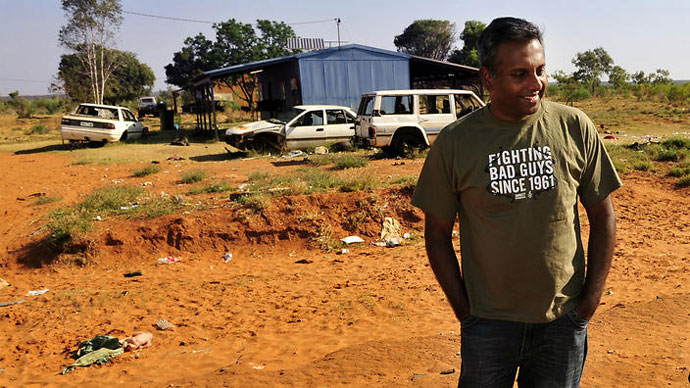A generation lost if Indigenous youth incarceration rate continues: Amnesty

Amnesty International's Secretary Generalg Salil Shetty. (AAP)
Amnesty International says an entire generation will be lost if Indigenous youth continue to be incarcerated at 24 times the rate than non-Indigenous youth.
Myles Morgan NITV News 1 June 2015
Aboriginal and Torres Strait Islander youth are 24 times more likely to be incarcerated than other Australian youth, Amnesty International has found.
Amnesty International secretary-general Salil Shetty at the National Press Club in Canberra said the rate would have devastating consequences.
"We will see another generation lost to failed government policies unless Australian Governments get smarter about this, and fast," Mr Shetty said.
He added that the Australian government must lose its racist perspective: "Frankly I don't think there's any other way of putting it rather than saying this is racial prejudice," he said. "Because essentially the view that the Aboriginal community can't manage their own affairs is a highly discriminatory approach.
"That state and federal governments aren't even keeping or sharing proper records on this detention is a scandal."
The human rights group has called for more Indigenous input in determining measures to reduce Indigenous youth incarceration rates.
"Targets should be developed in consultation with Indigenous peoples and organisations," the report said, echoing calls that have been made for years by other legal and human rights bodies.
"This will contribute to ensuring that culturally relevant and effective solutions are available to address the underlying causes of offending such that detention is a measure of last resort for Indigenous young people."
The call comes after it recommended in a report titled A brighter tomorrow released Tuesday that Australian governments immediately set justice targets if the nation is to reduce the overrepresentation of Aboriginal and Torres Strait Islanders in prison.
"The importance of the justice target here is that we need to have a clear goal as to where we want to get to," said Mr Shetty. "So then you have strategies to achieve that goal. And most importantly you need to have accountability. At the end of the day if you have a lot of money chucked at these problems and nothing coming out, who's accountable?"
Calls to include a justice target in the Close the Gap targets (committed to by the Council of Australian Governments) have been sounded for years.
But the Indigenous Affairs Minister, Nigel Scullion, has repeatedly ruled out creating a justice target.
"The Australian Government is not pursuing a justice target," a spokesperson for Nigel Scullion told NITV.
"The government is working with communities, the private sector and non-government sector through supporting a range of initiatives to tackle the underlying disadvantage that increases the likelihood of Indigenous Australians having contact with the criminal justice system," she said.
"The key to this is getting children to school, adults to work and making communities safer."
The Amnesty report calls for the Australian Government to "immediately reverse" its stance on a justice target.
Mr Shetty has spent the last week touring the country and speaking with Indigenous Australians seeking a solution to the over-representation of First Nations youths in jail.
On average between 2012 and 2013, a daily average of 454 Indigenous youths were in detention, compared to 329 non-Indigenous people, the Productivity Commission's Report on Government Services found.
The government spends approximately $409 million a year on youth justice services.
The West Australian government was singled out for withering criticism from the human rights group.
"In Western Australia, the situation is significantly worse than the national picture. Between July 2013 and June 2014, Indigenous young people were on average 53 times more likely" to be in detention, according to the Amnesty report.
For years, the West Australian Government has fended off criticism of its mandatory sentencing laws by community groups and the United Nations.
A third conviction for burglary in the state results in a mandatory minimum jail term for the offender. It also applies to a serious assault or grievous bodily harm conviction. While the state government has expressed regret over the clear over-representation of Aboriginal people in its jails, a review it commissioned last year also found its laws had reduced violent offences.
"The Australian Government should intervene so that these laws that are contrary to its obligation under international human rights law, are invalidated or repealed," the report noted.
Amnesty's recommendations to the Australian Government:
1. Through COAG and in consultation with Indigenous people, develop justice targets to reduce Indigenous youth detention rate.
2. Legislate in order to override mandatory sentencing laws for young people.
3. Ensure ongoing funding for NATSILS and the FVPLS
4. Quantify the level of unmet legal need experienced by Indigenous people and their families
5. Identify data required to implement a Justice Reinvestment approaching, including tasking a technical body to assist states and territories with data collection
6. Fund Indigenous community controlled bail accommodation to ensure young people aren't held in detention on remand because there are no other options
7. Develop legislation to ensure pre-trial detention is a last resort
8. Identify and address gaps in data collection on youth contact with the justice system
9. Recognise Foetal Alcohol Spectrum Disorders (FAS-D) as a disability under the National Disability Insurance Scheme
10. Urgently finalise an official diagnostic tool for FAS-D
11. Create or allow an independent body to access all places where people are deprived of liberty, including youth detention facilities

